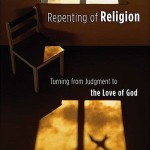We run our website the way we wished the whole internet worked: we provide high quality original content with no ads. We are funded solely by your direct support. Please consider supporting this project.
The “Heresy” of Failing to Love
In what is hands-down the most amazing prayer ever recorded, Jesus prayed to his Father that his disciples “may be one…just as you are in me and I am in you” so that “the world may believe that you sent me” (Jn.17:21). In other words, Jesus was praying that we who profess Christ as Lord would together mirror the perfect loving unity of the Father and Son. Not only this, but Jesus’ expectation was that the world would be lead to have faith in him by witnessing this love! “By this everyone will know you are my disciples, if you love one another” (Jn 13:35).
Hearing this prayer makes me wonder how God feels about the Church right now. I honestly don’t think it requires much speculation. The Church has splintered into thousands of competing and sometimes angry factions. In some circles — and, unfortunately, they tend to be the most vocal and the most public — sisters and brothers who dare to color outside the lines are flippantly bid “farewell” and assigned the label “heretic” — or perhaps even consigned to hell. Though Jesus hoped the Church would be the proof that he’s for real, the Church today has become the best argument that he’s not! Instead of the means of getting people into the kingdom, the Church is the main obstacle keeping people out. Christians are known in the broader society for a lot of things, but their depth of love for one another — let alone for “sinners” and “enemies” — doesn’t make the list (see Kinnaman & Lyons, UnChristian). In this light, the beautiful vision of the Church that Jesus expressed in his prayer on the night he was betrayed — the vision of a Church that reflects the perfect love of the triune God — almost sounds comical.
So what should we do? Whatever else might be said, I honestly don’t believe we’ll even begin to move in the right direction until we resolve that loving one another (and everyone else) is a higher priority than proving, protecting and enforcing the rightness of our doctrines.
I’m almost certain someone just now had the thought — “Here we go again, compromising correct doctrine in the name of love. More fluffy, post-modern, sentimental garbage!” Was I right?
The thing is, there’s absolutely nothing fluffy, post-modern or sentimental about placing love above doctrinal correctness, for this conviction permeates the NT! Truth be told, we shouldn’t even contrast “love” and “doctrinal correctness” in the first place. We should rather regard the command to love as the most foundational doctrine of the church and thus the most important doctrine to be correct on! Peter says, “Above all, love each other deeply, for love covers a multitude of sins” (and alleged “heresies”? I Pet. 4:8, cf. Col 3:14). If love is to be placed “above all,” then there simply can’t be any other command or doctrine or agenda that competes with it for the top position. It must stand on top alone. Paul makes the same point, but even more emphatically, when he tells us it doesn’t matter how right we are, how spiritually gifted we are, how intelligent or wise we are, or even how much faith and service we display: if these aren’t accompanied by love, they are a noisy gong or clanging cymbal (I Cor 13:1-3). In other words:
Correct doctrine – love= worthless noise!
If we take this teaching seriously, it means that nothing — absolutely nothing! — matters if love isn’t present…which means that love is the most-important doctrine we can ever embrace…which means that our willingness to love is the most important criteria of orthodoxy…which means that, if ever it is appropriate to label anything “heresy,” it is the failure to love.
And now you have to wonder why millions of people have been tortured and murdered by Christians throughout history for espousing “heretical” views about baptism, communion, the church and a very long list of other doctrines, while not one person (so far as I know) has been officially disciplined — let alone accused of “heresy” — for failing to adequately love (as when they tortured and murdered others in Jesus name, for example). We can have all the right doctrine in the world, but if we fail to love as Christ loved us, we are all “heretics.”
And now I have to confess that I am guilty of “heresy.” I am. I haven’t consistently loved everyone like Christ loved me.
I suspect I’m not alone.
Which maybe should make all of us hesitant to slap the label on anyone else. Whatever “heresy” they’re guilty of, its nothing compared to our own (see Mt 7:1-3).
Live in love (Eph 5:1)!
Blessings-
Greg
Related Reading

Is Islam Inherently Violent? – Further Thoughts
Greg originally posted some thoughts on Islam here. In this video, he discusses some responses he received, and further thoughts on a Kingdom posture toward Muslims.

The Image of Cross-Like Love: God’s Self-Portrait, Part 6
In the previous blog I argued that God is cross-like love. In this blog I’d like to take this a step further by demonstrating why the cross alone could function as the definitive revelation of God’s true character and by showing how this revelation weaves together everything Jesus was about. If you want to know…

Quotes to Chew on: God’s Love When We Rebel
“Despite the fall and its consequent curse, however, God’s love was not deterred. God is love. God doesn’t stop being God simply because the humans he created have rebelled against him. God does not abandon his goal of having others share in the eternal, ecstatic dance of the Father, Son and Holy Spirit. The world…

God’s Ways Are Higher Than Ours
A frequently quoted passage from the Old Testament comes from Isaiah 55. It reads: …my thoughts are not your thoughts, neither are your ways my ways… As the heavens are higher than the earth, so are my ways higher than your ways and my thoughts than your thoughts (vss. 8-9). I’ve often heard this passage…

What “God Loves You” Actually Means
From the beginning, God chose to have a people who would be the object of his eternal love, just as Christ is the object of his eternal love. God sought to acquire a “bride” for Christ who would receive and reflect the love of the triune community (Eph 5:25-32). And the only qualification for being…

Sermon Clip: Love: It’s All About the Cross
In this sermon clip, Greg Boyd talks about how Colossians 3:14 and the definition of love. God designed creation so that we would live in community with God and express God’s love towards each other and creation. However, sin disconnected us from God. In this sermon, Greg shows how we were created in the image…
